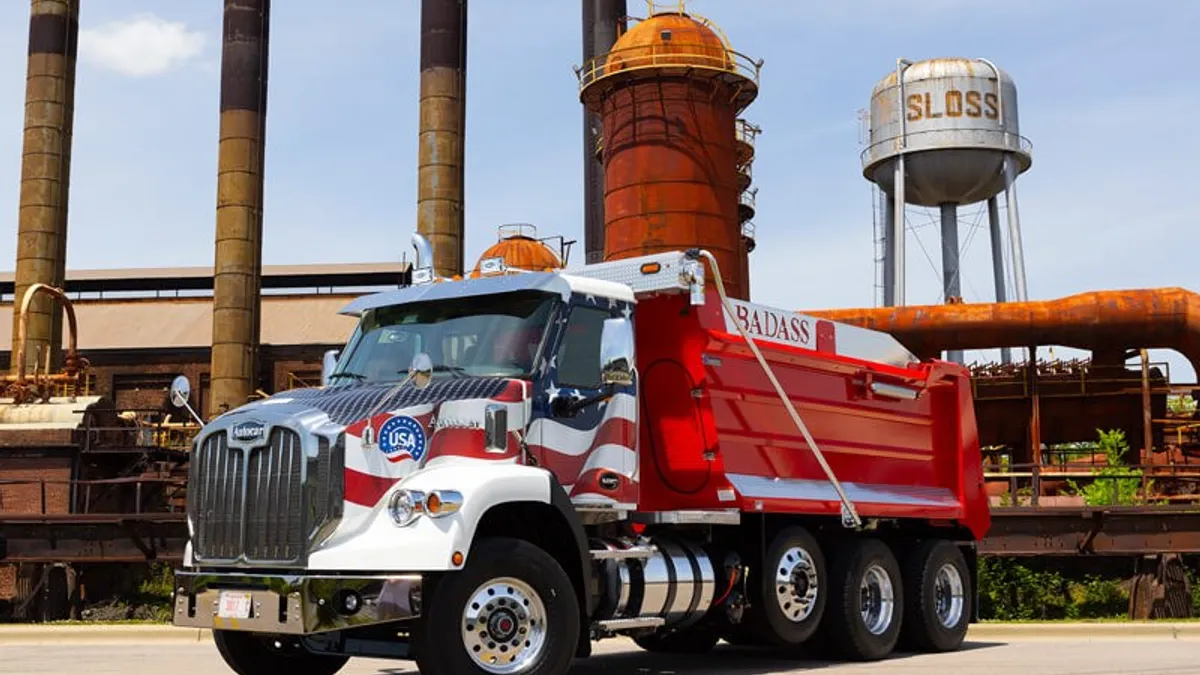Dive Brief:
- General Motors and heavy-duty truck manufacturer Autocar will partner on building vocational trucks using hydrogen fuel cells, according to a GM press release.
- The first vehicles using GM’s Hydrotec fuel cell technology — starting with cement mixers, roll-off and dump trucks — will go into production in 2026 at Autocar’s factory in Birmingham, Alabama, and will be sold directly to customers. After that, refuse trucks and terminal tractors will be built.
- Adding hydrogen-powered trucks to fleets of heavy duty vehicles would help meet proposed Environmental Protection Agency standards for greenhouse gas emissions per the Biden administration’s Clean Trucks Plan announced in 2021.
Dive Insight:
Although most major automakers are focusing on battery-electric vehicles in the shift to an electric future, hydrogen fuel cells are another zero-emissions option that some manufacturers — notably Toyota and Hyundai — have attempted to scale. Fuel cell vehicles convert hydrogen and oxygen into electricity, which is used to power the electric motors. The only byproduct of this process is water vapor.
But hydrogen has its drawbacks, which has limited its adoption in passenger vehicles. For one, Hydrogen fuel cell technology is much more expensive than battery-electric tech. And unlike battery-electric cars, fuel cell vehicles need refueling at special hydrogen filling stations, for which there’s limited infrastructure.
Yet electric commercial operations, like those using Autocar’s vocational trucks, face obstacles for using batteries. Heavy-duty truck operations are energy intensive, requiring extended periods of idling or traveling long distances that would require frequent charging or the use of large, heavy and expensive batteries.
“EV propulsion systems like GM’s Ultium Platform are great solutions for electrifying passenger vehicles, but larger vehicles like Autocar’s class 8 trucks, refuse trucks and terminal tractors require robust solutions that enable significant energy carrying capacity and fast refueling times,” said Charlie Freese, GM’s executive director at Hydrotec. “We want to enable zero tailpipe emissions solutions for the largest, highest energy consuming vehicles, and fuel cells are ideal for the most energy intensive applications.”
Because hydrogen technology requires shorter refueling time and allows for greater range, automakers may prioritize hydrogen fuel cells in commercial vehicles. Toyota’s Chief Technology Officer Hiroki Nakajima said at the Japan Mobility Show in October that commercial vehicles “are the most important area to try and proceed on with hydrogen,” in large part because commercial trucks have set routes “so you can operate stations with more stability.”
Each of GM’s Hydrotec power cubes has over 300 hydrogen fuel cells and delivers 77 kilowatts of power. The cubes also include thermal and power management systems and are optimized with cold start capability. The fuel cell technology can also be scaled across industries, including freight trucking, aerospace and locomotives.
In 2021, the EPA began the Clean Trucks Plan, a three-part rulemaking process, to determine new emissions standards for heavy-duty trucks, which are responsible for roughly 15% of all U.S. transportation energy use and emissions. The EPA announced in April the third proposed rule, which would require stronger carbon emissions standards for heavy-duty, vocational trucks beginning in model year 2027.
“Autocar provides customized vocational trucking solutions, and as regulations change, we see HYDROTEC fuel cells as an additional avenue for our customers to meet their EPA requirements with zero tailpipe emissions vehicles,” Eric Schwartz, Autocar president, said in a statement.
The price of hydrogen fuel cell technology may not be a deterrent for heavy-duty truck manufacturers as the technology becomes more widespread. According to a 2022 National Renewable Energy Laboratory analysis, improvements in vehicle emissions technology in line with Department of Energy recommendations would allow long-haul, heavy-duty trucks powered with hydrogen fuel cells to reach cost parity with diesel trucks by 2035.












